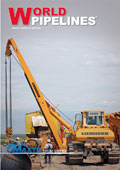Editorial comment
The oil and gas industry has undergone a period of unprecedented price volatility in recent months, with record prices followed by a crash and then a slow recovery. Asked to look ahead over the next year or so, nearly 200 of the industry’s leading executives see investment opportunities during a period of relative price stability, especially in the fast-growth economies in Asia, according to Deep water ahead?, a new report published by the Economist Intelligence Unit and sponsored by GL Noble Denton.
Register for free »
Get started now for absolutely FREE, no credit card required.
The views gathered to guide the report have helped bring clarity to a sector that has faced significant challenges in recent years, and it is apparent that its future direction will be governed by a series of crucial issues.
Those surveyed by the Economist Intelligence Unit agreed that innovation will play a key role in the industry’s development in the coming months and years. The technological advantages enjoyed by some of the international oil and gas companies give them leverage to open up previously unavailable reserves in deepwater and consider unconventional gas, for which demand is rising as utilities look for a relatively low-carbon, cost-effective ‘transition’ fuel to meet CO2 reduction goals.
Incidents in the Gulf of Mexico and offshore China have caused many to recalculate the risks the industry faces as it is pressed into these new frontiers. There is also closer scrutiny of the environmental impact of unconventional gas, which requires techniques to access that are still not fully understood.
Regulatory change in the wake of the Deepwater Horizon disaster is certain. According to the executives surveyed by the Economist Intelligence Unit, there is an expectation that regulation will become more stringent in North America, which could have a significant effect on costs and viability of projects. The longer-term impact of Macondo is forecast to be on companies’ operational strategy, especially as their safety record will become a more important factor in gaining access to global reserves.
Yet companies are cautiously optimistic about oil industry capital investment, with oil prices remaining relatively high and steady.
Natural gas has emerged as a key industry game changer, having gained widespread credibility as a relatively low-carbon ‘transition fuel’, especially for electricity generation. The emergence of large reserves of ‘unconventional’ gas in North America is highly attractive to companies looking to replace declining production. Natural gas prices, however, could remain depressed next year before Asian demand starts to erode oversupply, according to the Economist Intelligence Unit’s research.
But despite the future significance of large reserves of gas in North America, Asia is identified by the report as the clear emerging opportunity for the industry in terms of demand. E&P specialists in the region will need to deal with more complex relationships with national oil companies, and the future seems to lie increasingly with a ‘bespoke’ approach, whereby they provide specialised services in conjunction with NOCs in development projects. They may also have to agree to fund infrastructure projects, such as water or electricity.
Additionally, a new breed of ‘internationalising’ NOCs in Asia are increasingly competing in markets outside of their home countries. According to the report, companies such as PetroChina, Petronas and the Korean National Oil Company (KNOC) boast healthy cash flows and already operate in ways similar to IOCs – stimulating the idea of the rising power of these international national oil companies (INOCs) which will force a rethink of the relationship between IOCs and NOCs.
As we approach the end of Q1 2011, the oil and gas industry has much to be bullish about: strong oil prices, rising Asian demand, and the rise of natural gas, but the risk profile has changed too: uncertainty about regulation is high, environmental concerns are pushing up costs, and liabilities will likely rise too.
The demand for energy is taking the exploration, production and distribution of oil and gas to even tougher extremes of geography and climate, and the industry must focus on overcoming significant technical challenges. Key players in the industry will need to find more innovative solutions to mitigate risk, while operating more efficiently and sustainably. Their success will define their position and reputation in the market this year.
Paul Shrieve, Senior Vice President, Technical Assurance,
GL Noble Denton

